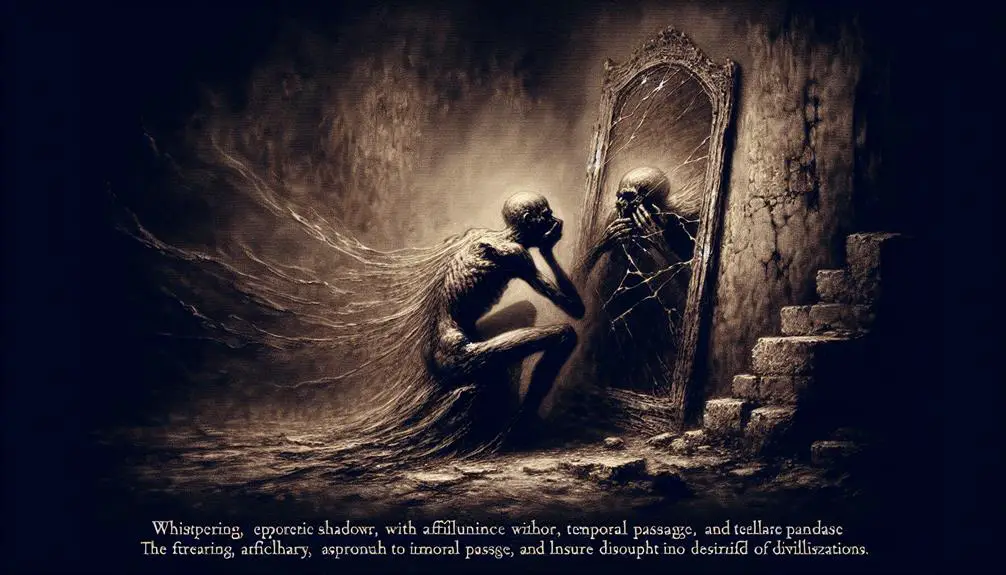Chart the biblical journey from joy to deep sorrow, uncovering the raw emotions and lessons hidden within.

Opposite of Joy in the Bible
As you walk through the valleys of human emotions, the Bible offers a map that doesn't shy away from the darker paths, like those trodden by Job during his trials.
It's intriguing how scripture vividly paints the opposite of joy, not just as mere sadness, but as profound despair and longing. From the wails in Lamentations to David's heart-wrenching psalms, there's a rawness to these expressions that might surprise you.
Let's explore these depths together, understanding that in the shadow of great joy, there's often a silhouette of deep sorrow waiting to tell its part of the human story.
Key Takeaways
- The Lamentations of Jeremiah depict sorrow as a significant opposite of joy, tied to national tragedy and divine judgement.
- Job's trials underscore despair and suffering as antitheses of joy, emphasizing endurance and faith amidst life's darkest moments.
- David's Psalms reveal despair and isolation, countering joy with a deep emotional struggle and a plea for divine intervention.
- Jesus' agony in Gethsemane highlights profound human vulnerability and despair, contrasting joy with the weight of impending sacrifice.
The Lamentations of Jeremiah

In the biblical canon, 'The Lamentations of Jeremiah' stand as a poignant embodiment of sorrow, diverging sharply from themes of joy. This collection of poetic lamentations serves not only as a profound expression of grief but also as an illustrative conduit for prophetic warnings and national mourning. Through its verses, you're invited into a narrative that starkly contrasts the celebratory and hopeful tones often found in other biblical texts.
Jeremiah, traditionally credited with authoring the book, articulates the profound despair experienced by the Israelites following the Babylonian siege of Jerusalem. This catastrophic event, resulting in the destruction of the city and the Solomon's Temple, marks a pivotal moment of national tragedy. The vivid descriptions of suffering and desolation within 'The Lamentations of Jeremiah' aren't mere historical recountings but are imbued with theological significance. They underscore the consequences of turning away from divine commandments, framing the calamities as a direct result of the nation's collective sin and abandonment of their covenant with God.
Moreover, the lamentations encapsulate the concept of prophetic warnings. Jeremiah's earlier prophecies, which foretold the impending doom as a repercussion for Israel's unfaithfulness, find their sorrowful validation within these laments. The text serves as a somber reminder of the dire consequences of ignoring divine admonishments.
Thus, 'The Lamentations of Jeremiah' stand as a testament to the depths of national mourning, highlighting the intertwining of spiritual and communal identity. It challenges readers to reflect on the complexities of faithfulness, divine justice, and the human capacity for both despair and hope.
Job's Trials and Suffering

Exploring another facet of biblical anguish, Job's trials and suffering offer a profound study in the endurance of faith amidst extreme adversity. Unlike the communal lament found in the book of Lamentations, the Book of Job delves deep into personal catastrophe and the resilience of an individual's faith in the face of relentless misfortune. Job, a righteous man subjected to immense suffering and loss, embodies faith's resilience when confronted with seemingly insurmountable trials.
Analyzing Job's ordeal, you discover that his story isn't merely about suffering; it's a complex exploration of faith, morality, and the human condition. The narrative intricately examines how faith can withstand the test of extreme adversity, providing invaluable endurance lessons. Job's unwavering belief, despite his friends' accusations of wrongdoing as the cause of his misfortunes, highlights a critical aspect of faith's resilience: the capacity to maintain trust in divine goodness and justice, even when faced with inexplicable suffering.
Furthermore, Job's trials underscore a significant theological debate on the nature of suffering and divine justice. Through Job's dialogues with his friends and his eventual confrontation with God, the text invites you to ponder the complexities of faith when easy explanations for suffering are insufficient. Job's enduring faith, despite his profound losses and the absence of clear reasons for his suffering, showcases the depth of trust and perseverance necessary for navigating life's darkest moments.
In essence, Job's story offers a compelling narrative on the resilience of faith and the lessons on endurance that you can glean from facing adversity with unwavering belief.
Ecclesiastes on Vanity

The Book of Ecclesiastes presents a profound meditation on vanity, challenging readers to contemplate the ephemeral nature of worldly pursuits and achievements. It delves deeply into life's meaninglessness and the pursuit's futility, offering a stark perspective on human endeavors. As you explore its passages, you're confronted with the concept that much of what occupies human effort is 'vanity and a striving after wind,' a phrase that resonates throughout the text, encapsulating the essence of its message.
Ecclesiastes doesn't shy away from confronting the realities of life's transient nature. It questions the value of wisdom, wealth, and labor when, ultimately, all lead to the same end—death. This realization forces you to reckon with the pursuit's futility, as the text asserts that neither wisdom nor folly offers a lasting legacy or satisfaction. The pursuit of pleasure, wealth, and achievement is portrayed not as inherently wrong but as ultimately unsatisfying in providing life's meaning.
Furthermore, Ecclesiastes offers a unique perspective by not providing easy answers or solutions to the dilemma of life's meaninglessness. Instead, it invites you into a reflective journey, encouraging a shift in focus from worldly achievements to appreciating life's simple pleasures and fearing God. This approach fosters a deeper understanding of vanity, not as mere cynicism, but as a call to seek meaning beyond the material and transient.
In essence, Ecclesiastes serves as a critical reminder of the limitations of human wisdom and effort, urging you to look beyond the superficial and confront the profound questions of existence with honesty and humility.
David's Psalms of Despair

Delving into David's Psalms, one encounters profound expressions of despair, showcasing the author's intimate struggles and deepest sorrows. These poetic cries serve as a window into the heart of a man who, despite his victorious encounter with Goliath and his anointment as Israel's future king, grappled with profound emotional turbulence. David's candidness in his psalms provides a unique perspective on the spiritual and emotional landscape of biblical figures.
To evoke emotion in the audience, consider the following emotional elements present in David's Psalms of Despair:
- The Weight of Responsibility: Following Goliath's defeat, David wasn't only thrust into the limelight but also burdened with the weight of future kingship and the expectations of his people.
- Isolation and Misunderstanding: Despite his heroic acts, David faced isolation, particularly as Saul's jealousy escalated, leading to attempts on his life and forcing him into hiding.
- Guilt and Repentance: David's psalms often reflect a deep sense of personal guilt and a longing for divine forgiveness, underscoring the complexity of his internal struggle.
- Seeking Divine Intervention: Amid his despair, David consistently seeks God's intervention, demonstrating his reliance on divine strength beyond his own.
These elements, when analyzed, reveal a multifaceted picture of despair that's deeply human yet intertwined with a persistent faith. David's ability to articulate his despair, while still holding onto hope, offers a powerful testament to the human experience, making his psalms relatable centuries later. The juxtaposition of his profound sorrow against his unyielding faith provides critical insight into the biblical understanding of despair.
Jesus' Agony in Gethsemane

Why does the account of Jesus' agony in Gethsemane resonate deeply with scholars and believers alike, marking a pivotal moment of human vulnerability and divine submission in the New Testament narrative? This scene, occurring in the shadowy confines of an olive grove, is laden with symbolism and emotional depth, inviting a nuanced analysis of its theological and existential implications.
The Olive Press symbolism is particularly evocative, as Gethsemane itself means 'oil press.' In this setting, Jesus' profound distress and foreboding sense of suffering are poignantly depicted. Just as olives are crushed to produce oil, so too is Jesus' spirit pressed by the weight of impending crucifixion and the burden of humanity's sins. This imagery underscores the transformative suffering Jesus undergoes, aligning his personal agony with a broader salvific purpose.
Moreover, the Prayer's intensity that Jesus exhibits in Gethsemane further illuminates his dual nature as both fully human and fully divine. His repeated pleas, 'let this cup pass from me,' reflect a genuine grappling with fear and a deep desire to align his will with that of the Father. This moment of intense prayer reveals Jesus' humanity in its most vulnerable form, yet it also signifies his ultimate submission to God's will, thereby exemplifying perfect obedience and trust.
In essence, Jesus' agony in Gethsemane stands as a profound testament to the complexities of faith, the realities of human suffering, and the redemptive power of divine submission. It invites believers and scholars to ponder the depths of Jesus' sacrifice and the profound love that underpins the Christian narrative.
Frequently Asked Questions
How Does the Concept of Joy in the Bible Contrast With Modern Understandings of Happiness?
You're exploring how the Bible's view of joy differs from today's happiness metrics.
The Bible frames joy as a deep, enduring state, often unrelated to external circumstances, highlighting an emotional dichotomy with modern happiness, which tends to be measured by immediate, tangible outcomes.
This contrast invites you to consider the depth and sources of your own happiness, challenging the fleeting, surface-level metrics often applied in contemporary society.
Are There Any Biblical Figures Who Found Joy in Situations of Despair or Suffering, Outside of the Well-Known Stories Mentioned?
Yes, there are biblical figures who exemplified joy amidst despair, beyond the famous tales.
You'll find Job's resilience striking; despite immense suffering, he maintained his faith, embodying joy through perseverance.
Similarly, Paul's contentment is noteworthy. Even imprisoned, he expressed joy in his letters, illustrating that one's spirit can remain unbroken and joyful, regardless of physical circumstances.
Their stories highlight a profound understanding of joy that transcends mere happiness.
In What Ways Do Biblical Teachings Suggest Overcoming the Opposite of Joy, Without Directly Referencing the Specific Sections Mentioned?
You're exploring how to conquer despair through biblical teachings, focusing on faith resilience and spiritual practices. These teachings suggest that by nurturing your faith and engaging in spiritual practices, you can build resilience against despair.
Analytically, this approach underscores a juxtaposition between despair and joy, illustrating how faith acts as a bridge. Essentially, by deepening your spiritual practices, you're equipped to navigate life's challenges with a more profound sense of hope and strength.
How Has the Interpretation of the Opposite of Joy in the Bible Changed Over Time, Especially in Contemporary Christian Theology?
In contemporary Christian theology, the interpretation of sorrow has evolved significantly. Historical contexts and theological debates play crucial roles in this shift.
Initially, sorrow was often seen as a direct consequence of sin. Nowadays, it's more commonly understood as part of the human experience, offering growth and deeper faith understanding.
This nuanced view allows for a more compassionate approach to dealing with life's challenges, reflecting broader theological and societal changes.
Can the Experience of the Opposite of Joy, as Depicted in the Bible, Offer Any Insights Into Dealing With Grief and Loss in Today's Society?
You'll find that the Bible's portrayal of sorrow can offer deep insights into coping with grief and loss today. Modern psychology and cultural rituals both draw from these ancient narratives, suggesting a timeless connection between human experiences across epochs.
Conclusion
Ironically, the very scriptures that celebrate joy also delve deep into its antithesis. As you've journeyed through Jeremiah's lamentations, Job's trials, Ecclesiastes' musings on vanity, David's despairing psalms, and Jesus' Gethsemane agony, it's clear that sorrow is as much a divine experience as joy.
This paradox isn't just a biblical contradiction; it mirrors life's complex tapestry, where joy and sorrow are inseparably woven, offering a profound reflection on the human condition through a sacred lens.



Sign up